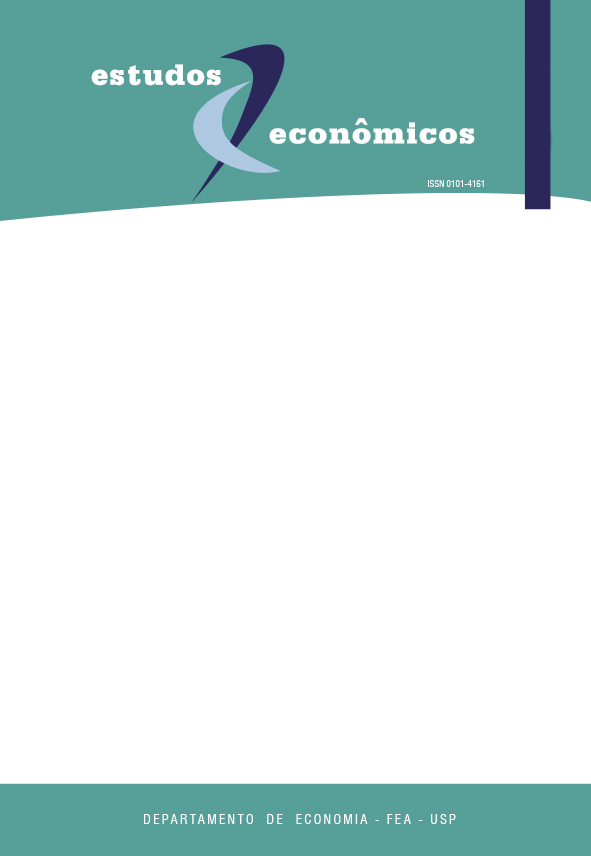Moeda, tesouro e riqueza: uma anatomia conceitual do mercantilismo britânico do início do século 17
DOI:
https://doi.org/10.1590/S0101-41612009000300005Keywords:
Mercantilism, money, seventeenth century, pre-classical British economic thought, favorable balance of trade doctrineAbstract
When evaluating theoretical systems of the past, one is frequently misled by tacitly identifying yesterday's theoretical concepts with those currently prevailing, a problem made more serious when dealing with ideas which predate the full consolidation of a discipline. Studies of mercantilistic doctrine use to be tainted by such difficulties. In the present article, we offer a new perspective regarding the ideas of seventeenth-century British economic authors, evaluating them in light of their proper intellectual context. We argue that the period is characterized by an understanding of the economic realm in which money plays a central role. Authors such as Malynes, Misselden and Mun have believed that a proper money management could assure a well-functioning international trade and dynamize domestic economic activity, guaranteeing national prosperity. Comprehending this shared analytical base, we can grasp the origins of the intense divergences among those authors, which would determine the path of subsequent theoretical debate.Downloads
References
COLEMAN, Donald C. Eli Hecksher and the idea of mercantilism. Scandinavian Economic History Review, v. 5, 1957.
DESMEDT, Ludovic. La ‘sagesse pratique’ des premiers mercantilistes anglais:
l’analyse du change et du commerce exterieur au début du XVIIe siècle. LAT EC
– Document de Travail – Economie, Université de Bourgogne, n. 8, 1998.
FINKELSTEIN, Andrea. Harmony and the Balance: an intellectual history of seventeenth-century economic thought. Ann Arbor: University of Michigan Press, 2000.
GOULD, J. D. The trade depression of the early 1620’s. Economic History Review, Second Series, v. VII, n. 1, p. 81-90, 1954.
GOULD, J. D. The trade crisis of the early 1620’s and English economic thought. Journal
of Economic History, v. 15, p. 119-133, 1955.
HECKSCHER, Eli. La época mercantilista: historia de la organización y las ideas econômicas desde el final de la edad media hasta la sociedad liberal. México: Fondo de Cultura Económica, 1943.
HINTON, R. W. K. The mercantile system it the time of Thomas Mun. Economic History Review, New Series, v. 7, n. 3, p. 277-290, 1955.
JOHNSON, E. A. J. Predecessors of Adam Smith: the growth of British economic thought. New York: Augustus M. Kelley Publishers, 1965.
KEYNES, John Maynard. The general theory of employment, interest and money. London:
Macmillan and Co., 1936.
KINDLEBERGER, Charles P. A financial history of Western Europe. New York, Oxford:
Oxford University Press, 1993.
MAGNUSSON, Lars. Mercantilism: the shaping of an economic language. London/
New York: Routledge, 1994.
MALYNES, Gerrard. A Treatise of the Canker of England’s Common Wealth. Edição
fac-simile. London, 1601.
MALYNES, Gerrard. The Center of the Circle of Commerce. Edição fac-simile. London, 1623.
MISSELDEN, Edward. Free Trade or the meanes to make trade flourish. Edição facsimile.
London, 1622.
MALYNES, Gerrard. The Circle of Commerce or the Balance of Trade, in defence of free trade, London, 1623, edição fac-simile.
MUCHMORE, Lynn. Gerrard de Malynes and mercantile economics. History of Political Economy, v. 1, p. 336-358, 1969.
MUN, Thomas. A Discourse of Trade from England unto the East Indies. Edição facsimile.
London, 1621.
MUN, Thomas. England’s Treasure by Forraign Trade, Reprinted: Oxford: Basil Blackweel, 1928.
SCHMOLLER, Gustav. The mercantile system and its historical significance. Fairfield: Augustus M. Kelley Publishers, 1989.
SMITH, Adam. The Wealth of Nations. New York: Random House, Inc., 1937.
SUPPLE, Barry E. Comercial crisis and change in England, 1600-1642. Cambridge Mass.: Cambridge University Press, 1959.
VILAR, Pierre. Ouro e moeda na história, 1450-1920. Rio de Janeiro: Paz e Terra, 1981.
Downloads
Published
Issue
Section
License
Copyright (c) 2009 Carlos Eduardo Suprinyak

This work is licensed under a Creative Commons Attribution-NonCommercial 4.0 International License.
By submitting an article, the author authorizes its publication and attests that it has not been submitted to any other journal. The original article is considered final. Articles selected for publication are proofread for grammatical and orthographic errors. The journal does not pay rights for published articles. The Institute of Economic Research from the School of Economics, Business and Accounting of the University of São Paulo (Instituto de Pesquisas Econômicas da Faculdade de Economia, Administração e Contabilidade da Universidade de São Paulo) owns the journal's copyright.





 Atualizado em 14/08/2025
Atualizado em 14/08/2025